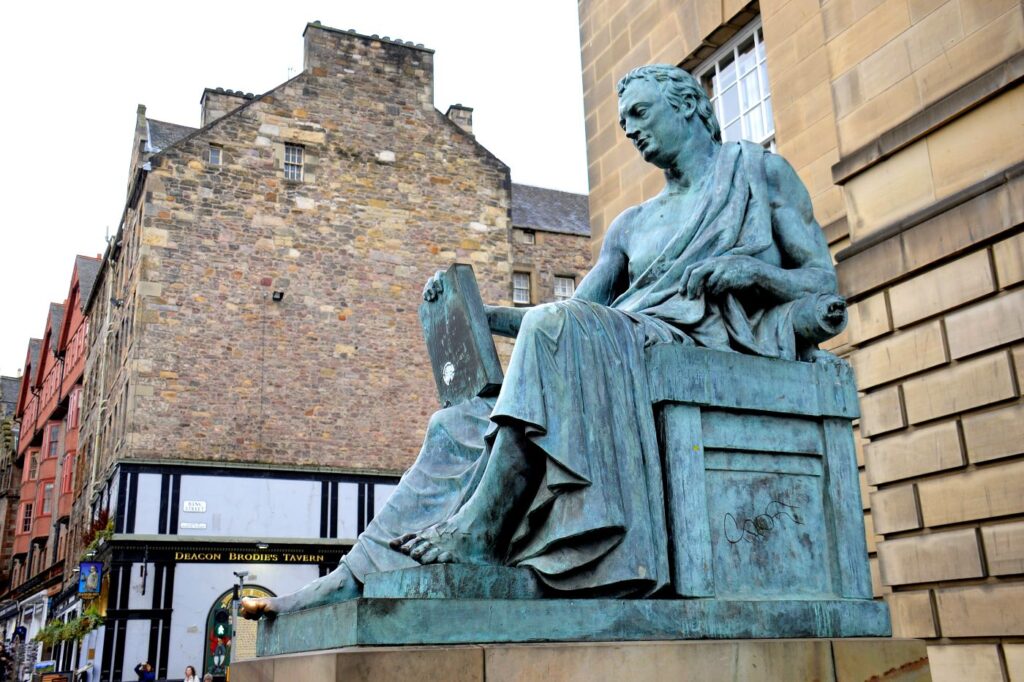Americans are increasingly anxious. Thirty percent of adults aged eighteen and older report symptoms of anxiety and depression, and the adult suicide rate has increased by 30 percent over the last two decades. Anxiety is increasing among young people, too, particularly in the wake of the pandemic. In 2022, the United States Preventive Services Task Force recommended that adolescents and children as young as eight be screened for anxiety disorders.
The isolation that continues to define American adolescence doesn’t help. In May of 2023, U.S. Surgeon General Dr. Vivek Murthy released an advisory acknowledging that loneliness is detrimental to mental health and can increase the likelihood of premature death.
The ill effects of isolation on our mental health are not limited to our present cultural moment. In fact, the works of Enlightenment philosophers like David Hume reveal that many of our forefathers experienced similar levels of anxiety and depression, largely spurred by feelings of isolation. Here, we will examine the philosophical roots of our anxiety as seen in Hume’s works.
The Philosophical Roots of Our Anxiety
Start your day with Public Discourse
Sign up and get our daily essays sent straight to your inbox.In the book The Wisdom of Our Ancestors, James McAleer and Alexander S. Rosenthal-Pubul observe that the Western philosophical tradition is characterized by “intense anxiety.” This is evident in Hume’s writings.
Attempting to leave behind what he called the “ravings” of Plato, the substantial forms of Aristotle, and essentially every element of Christian doctrine, Hume rejected the classical and Christian Western tradition and tried to establish new foundations for thinking about human nature.
By the end of Book 1 of his Treatise of Human Nature, however, Hume expressed in stark terms the exhaustion caused by his philosophical investigations. Having pondered in isolation some of the most perplexing philosophical questions, including reasons for believing in the existence of the external world, the self, and necessary causation, Hume discovered that he had no rational justification for any of these beliefs. He lost all sense of himself and his surroundings.
Reflecting on the dire state in which his isolated philosophizing left him, Hume wrote in the Treatise:
I am first affrighted and confounded with that forlorn solitude, in which I am placed in my philosophy, and fancy myself some strange uncouth monster, who not being able to mingle and unite in society, has been expelled all human commerce, and left utterly abandoned and disconsolate.
To recover from his “forlorn solitude,” Hume took a break from his solitary work and re-established social bonds. His encounters with others reminded him of the embodied, physical reality of the external world: one that became murky when he sat alone and pondered it.
I dine, I play a game of backgammon, I converse, and am merry with my friends; and when after three or four hours’ amusement, I would return to these speculations, they appear so cold, and strained, and ridiculous, that I cannot find in my heart to enter into them any farther.
At the same time, however, Hume gleaned an important lesson from his prolonged period of intense and isolated introspection: companionship, hospitality, and conversation draw us out of ourselves and the incessant worries and fears that plague us.
“A perfect solitude is, perhaps, the greatest punishment we can suffer,” Hume wrote. “Every pleasure languishes when enjoyed apart from company, and every pain becomes more cruel and intolerable.”
Hume gleaned an important lesson from his prolonged period of intense and isolated introspection: companionship, hospitality, and conversation draw us out of ourselves and the incessant worries and fears that plague us.
Amusement Alone Will Not Cure Anxiety
As much as Hume can teach us about the benefits of companionship, he can also teach us about the need for spiritual nourishment as a means by which to find purpose in life and prepare well for death.
Hume did not just suffer from what was called, in the eighteenth century, “the disease of the learned,” that is, depression deriving from excessive time spent with books and too little time with people. Ten years earlier, Hume had experienced distress by trying to live up to a rigid moral code. When he was eighteen, Hume wrote a letter to a physician in which he described his mental crisis induced by trying—and failing—to live up to Lord Shaftesbury’s rigid system of neo-Stoic morals laid out in Characteristicks of Men, Manners, Opinions, and Times.
This episode led him on the ten-year intellectual journey that resulted in the writing of the anti-Stoic Treatise. While preparing to write the Treatise, Hume consulted the moral system of Shaftesbury’s rivals, skeptics and Epicureans like Pierre Bayle and Bernard Mandeville. This moral system equated pleasure with goodness. It denied that religion was the basis of objective moral truth. And it trusted experience, alone, as the authority in philosophical investigation.
It was not only isolation, then, that made Hume anxious and depressed: this strenuous moral and spiritual effort, devoid of any real meaning, burdened him. Hume’s moral and political solution to his distress was therapeutic, requiring not a deep dive into higher eternal questions, but a focus on the present: specifically, finding a way to balance the passions to achieve tranquility and keep anxiety at bay in the present moment.
The therapeutic element of Hume’s moral and political theory reverberates throughout the liberal tradition from Mill to Rawls. The private focus on finding peace of mind and the public focus on politeness—combined with an agreement to “live and let live”—served, for Hume, as a winning formula for a peaceful, prosperous, and happy society.
Hume’s thoroughly this-worldly attitude was known throughout Great Britain; it generated great attention during his lifetime, especially at the time of his death. Adam Smith, who visited Hume on his deathbed, reported that Hume approached “as nearly to the idea of a perfectly wise and virtuous man, as perhaps the nature of human frailty will permit.”
Although the story about the irreligious Hume’s tranquil death spread widely, there was an alternate report, originating with his housekeeper, that Hume was terrified as he approached death. Alexander Haldane, in Memoirs of Robert Haldane (1852), shared a story that he heard from his father and that was corroborated elsewhere. Robert Haldane’s neighbor, Mr. Abercromby of Tullibody, shared a stagecoach with Hume’s housekeeper, most likely Margaret Irvine. Irvine countered the standard narrative of Hume’s tranquil death and reported what she witnessed in his final days:
Mr. Hume was cheerful even to frivolity, but . . . when alone he was often overwhelmed with unutterable gloom, and had, in his hours of depression, declared that he had been in search of light all his life, but was now in greater darkness than ever.
If true, this account reveals the limits of Hume’s framework. The Cambridge Platonist Ralph Cudworth stated that “the atheistick design in shaking off the belief of a God” makes us lose “the least hope, faith, or confidence.” We can spend all our lives “running from fear,” Cudworth explained, but if we run from God, by the time we are forced to confront death, we will find ourselves plunged right back into the very fears we fought so hard to escape.
It was not only isolation, then, that made Hume anxious and depressed: this strenuous moral and spiritual effort, devoid of any real meaning, burdened him.
Recovering the Virtue of Piety
There are numerous causes of anxiety in our fast-paced, hyperproductive, digitized world. Hume reminds us that play, company, and conversation can indeed alleviate some of our anxieties. This testifies to the goodness of sociability, a natural human need. But Hume disregards a virtue that should accompany sociability: piety.
Piety moves us to seek friendship with others, from family members, neighbors, and fellow citizens, to God and ourselves. Hume was content to recommend friendship with others, that is, relationships that are the product of choice. But Hume prioritized choice over duty, pleasure over sacrifice, and to his detriment.
Hume knew the work of Francis Hutcheson well. And Hutcheson, Chair of Moral Philosophy at the University of Glasgow, wrote, in A Short Introduction to Moral Philosophy, that the most “natural” division of the virtues is “piety toward God, and Good-will toward men” along with “such virtues as immediately relate to ourselves, by which a man immediately aims at his own perfection.” Duties toward ourselves, Hutcheson wrote, promote a “self-culture which is subservient to piety and humanity.”
Hume, however, did not make duty to God an aspect of virtue. In fact, he thought “religious principles” throughout history resembled “sick men’s dreams” or “the playsome whimsies of monkies in human shape.”
Hume’s philosophic “melancholy and delirium” made him lose all sense of himself and his surroundings. As a result, he sought connections with others. But his connections, though filled with good cheer and good humor, remained superficial. For example, he avoided conversations about controversial moral and spiritual questions with his Presbyterian pastor-friends to prevent passionate disagreement. One can see the prudence in preferring discussions of literature and travel at the dinner table to maintain camaraderie among those who disagree. Disagreement is uncomfortable. But beyond the dinner table, in his life and writings, Hume neither explored nor exhibited the kind of piety that, by helping him come to terms with a greater providential order, and the unchosen obligations that derive from that order, finally would have made him feel at home in the world.
The internet, and social media in particular, which promise to connect us to others, have made us lonelier and more anxious than ever. There is more to life than convenience, choice, and consumption. Recognition of our dependence on others and on God, and the unchosen obligations that derive from them, can help us to cultivate piety. And that piety connects us deeply not only with family and fellow citizens but with God. That is the kind of connection Hume never enjoyed. And according to his housekeeper, who was with him when he died, that haunted Hume at his death.
Image by Osama Shukir Muhammed Amin FRCP(Glasg) – Own work, CC BY-SA 4.0. Image resized.














